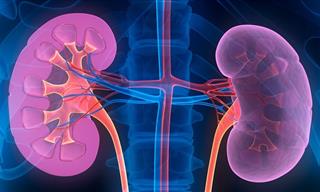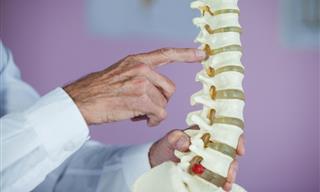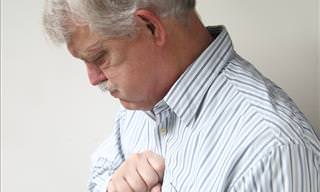1. Obstructive Sleep Apnea
Nighttime urination is so prevalent in sleep apnea that it became a tell-tale sign of the disease, as significant as snoring, but many people don’t suspect that sleep apnea may be the cause of frequent nighttime urination. The American Sleep Apnea Association mentions that over 84% of patients suffering from sleep apnea reported nocturia.
Many patients with untreated sleep apnea report 6 or more nighttime bathroom trips. The underlying mechanism of nocturia in sleep apnea is unclear, but it is known that patients who start a treatment targeting sleep apnea find that it resolves the nightly bathroom breaks almost completely.
2. Bladder Prolapse
A bladder prolapse can happen when a woman’s bladder is poorly supported by pelvic muscles and ligaments, as a result, it descends to the vaginal wall. Patients with even a minor prolapse complain about nocturia, and bladder prolapse is one of the leading causes of nocturia in women.
In this condition, nighttime urination likely occurs because the tension of the vagina can aggravate the bladder when in a horizontal position, and one gets the urge to urinate, even when the bladder isn’t full.
3. Enlarged Prostate
An enlarged prostate is called benign prostatic hyperplasia (BPH) in medical terms. In patients suffering from BPH, the urinary tract changes its shape and functionality together with the enlargement of the prostate.
BPH is one of the major causes of nocturia in males, which is brought about by increased bladder sensation and the narrowing of the urethra, which can make you feel an urgency to urinate, even when your bladder is nearly empty. In these cases, nocturia is not the only symptom and an increased need to urinate and incontinence are also observed.
4. Anxiety and Depression
Mental problems, such as anxiety and depression may manifest themselves in the form of nocturia, too. Although the exact link between these 2 conditions is unknown, nocturia is believed to be a side effect of sleep disturbances that come with anxiety and depression.
In these cases, it’s not the need to empty the bladder that wakes a person up, but they take a trip to the bathroom when they’re already up. To stop both the nocturia and the sleep disturbances, it is recommended to try to relax before sleep, either by doing breathing exercises, aromatherapy, or meditation.
It is also a good idea to avoid evening naps, nighttime meals and caffeinated drinks in the evenings.
5. UTIs
One of the most common causes of nocturia are a urinary tract infections (UTIs), cystitis, as well as bladder or kidney infections. These infections of the urinary system usually cause frequent burning sensations before, during and after urination, as well as the urgency to urinate during the day and night.
Other symptoms of these infections include changes in urine, fever, pain in the lover back and lower pelvis.
6. Swelling of the Legs (Edema)
There are many causes of edema, ranging from liver failure to heart disease, but all of these conditions cause excess water buildup in the tissues of the extremities.
This extra fluid has to go somewhere, so the body transports this fluid to the kidneys to excrete it from the body, which usually happens at night. This way, patients suffering from leg swelling may have to take a few night trips to the bathroom.
7. Multiple Sclerosis
People who suffer from multiple sclerosis, too, can experience nocturia, with an estimated 80 percent having some sort of bladder dysfunction during the progression of the disease, with some patients having to wake up 5-8 time during the night, feeling the urge to urinate.
This symptom occurs because MS patients have suffered damage to the nervous system, which may result in the disruption of nerve signals connected to the functioning of the bladder.
8. Parkinson’s Disease
Parkinson's disease (PD) is the 2nd most common neurodegenerative disease. In the course of the disease, patient most commonly experience motor control difficulties, but as much as 60% of PD patients also have bladder symptoms.
Although the causes of nocturia in PD are poorly understood, it was suggested that it may be due to higher quantities of urine production or a lower capacity of the bladder.
9. Overactive Bladder

An overactive bladder is a diagnosis encompassing a variety of conditions that all have the same symptom: a sudden unstoppable urge to urinate. Nocturia is one of the symptoms of an overactive bladder, and it is more common in people over the age of 60, but it has also been reported that one in three adults over the age of 30 needs 2 or more nighttime bathroom trips as well.
Other symptoms of an overactive bladder include a sudden uncontrollable urge to urinate, frequent incontinence, and more than 8 bathroom breaks in a 24-hour period. The reasons of this conditions are unknown, and therapy includes a variety of exercise, dietary restrictions, botox injections and even electro stimulation.
10. Tumors In the Pelvic Area
Both malignant and benign tumors of the organs of the lower abdomen, such as kidneys, reproductive organs and the digestive system may cause nighttime urination, as the tumor may press against the bladder, making it smaller and capable of holding less urine.
This will usually cause not only nocturia, but also incontinence and frequent urination during the day time.
11. Diabetes
Having high blood glucose levels can make the body get rid of excess glucose through urine. The more sugar the urine contains, the more it stimulates urine production.
This will make you urinate more often throughout the day and night, and it will also bring about the sensation of thirst. There is also a form of diabetes called diabetes insipidus that causes excess urination, with some patients urinating 20 litres (5.28 gallons) more than a normal person every day.
Please keep in mind that the information contained in this article is presented for informative purposes only. If you experience nocturia or any other suspicious symptoms, make sure to get a diagnosis by a specialist.
 Go to BabaMail
Go to BabaMail






























